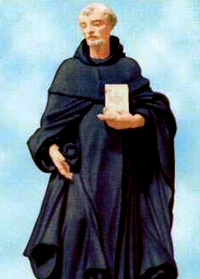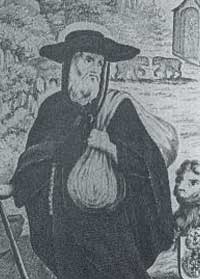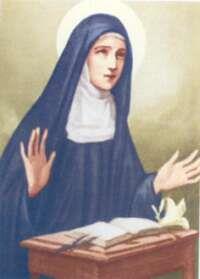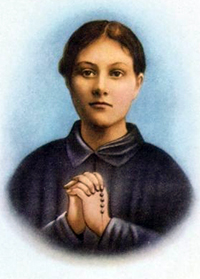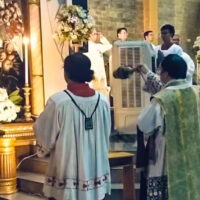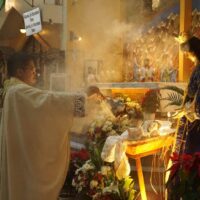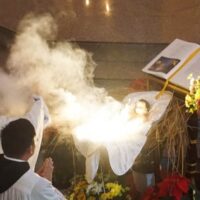 Florentine by birth, Juliana was attracted by the holy lives of the first Friars of the Servite Order. She consecrated her life to God, devoting her time to prayer an works of penance and charity. She is properly considered among those women who, while continuing to live in their own homes, adopted a Servite way of life. She received the habit of the “mantellates”.
Florentine by birth, Juliana was attracted by the holy lives of the first Friars of the Servite Order. She consecrated her life to God, devoting her time to prayer an works of penance and charity. She is properly considered among those women who, while continuing to live in their own homes, adopted a Servite way of life. She received the habit of the “mantellates”.
Juliana occupied a singular position among these women, so that the tradition of the Order has considered her the foundress of the Servite sisters. She is noted for her devotion to the Mother of the Lord and her love for the Eucharist. Her body is venerated in the Basilica of the SS. Annunziata in Florence. She was canonized by Pope Clement XII in 1737.
From Liturgy OSM
This city of ours (Florence) was the birthplace of Juliana, a brilliant example of virginity and a remarkable pride of the women. She was one who became famous for her great sanctity. She did not adorn herself with vain splendor nor was she attracted to passing things or the outward appearance of fame or beauty but rather by the reward of virtue, in which true beauty and the glory of victory reside. That she was a devoted follower of holy sermons is proven by the testimony of what she did. Among other things, she assumed the mourning clothes of the Blessed Mother and obtained thereby an immortal place for herself in heaven, wearing the habit of the Virgin into eternal life.
In regard to the ever-to-be-feared divine judgment, consider an amazing example of which we read. The noble Juliana, as exceptionally beautiful as she was rich, was born into the Florentine senatorial family of the Falconieri. When she was about the age of fifteen, she used to hear her uncle Alexis preach things like this about the judgment. He was one of the Seven Holy Founders of the Order of Servants, at whose death angels in the form of brilliant birds were heard singing heavenly hymns and already canonizing him. She too saw him transformed in the pulpit into the likeness of a seraph. This kindled in her such a contempt of earthly things and the desire for heaven that she never ceased to beg her parents and the Queen of Heaven with tearful prayers until, with divine approval and the common consent of all, she was invested in the Order of the Servants of the Blessed Virgin.
As Clare of Assisi had been for the Franciscan Order and Catherine of Siena for the Dominican Order, she became the great leader of the sisters and nuns of Mary’s Order; first among them during her lifetime and renowned for miracles at her death. Led by fear as well as by love of the divine judgment, she is acknowledged as outstanding in a threefold order of excellence: birth, allegiance and theology.
Hers was, first of all, the natural excellence of birth by reason of the Falconieri family, which was one of the outstanding families of the city. But even more so by reason of her native Florence, since in Tuscany an abundance of all the goods of body, wealth and spirit blossom and prosper; as its poet says, art and nature worked together to bestow choicest blessings on it and to offer it as a teacher for the world.
Secondly, she is even more highly praised for the excellence of her allegiance, for she was outstanding as a faithful soldier of Jesus and the glorious Virgin, one who always won victory, in fact glorious triumph, over the flesh, the world and the devil. She always imitated the courageous spirit of her uncle Alexis by offering to the men, in my opinion, an example of virtue even as a girl.
Thirdly, she is exalted by the excellence of her relationship with God, which is a “grace which makes one pleasing,” as Bartolus says. I This was apparent in many signs and wonders, but especially at her death when Juliana, wasted away by hair shirts, vigils, prayers, fastings and iron belts which had by now become embedded in her flesh, could no longer hold anything in her stomach. She yearned ardently for the Body of Christ, which could not be given her because of the danger of inducing vomiting. She pleaded earnestly and tearfully that at least her breast be washed and covered with a clean cloth and that the Eucharist be placed over that burning heart where she was experiencing the strong longing of love. When this was happily permitted, a miracle took place never before heard of in this world, one that would be celebrated everywhere. She became more beautiful, more like an angel and, dissolved by the extremes of delight, quietly passed away. The host could no longer be found anywhere. Only God knows, not I, whether this was because Jesus, on the strength of that love of hers, had draw out and transformed her soul; or because he had returned to heaven with such a bride to celebrate the everlasting wedding feast.
If you don’t weep over these facts, my dear reader, tears shed for anything else are meaningless. See how wonderful is the fruit of meditating always upon the judgment!
Inspiration and model of communities of Servite women
Juliana was born in Florence in the thirteenth century when some of the Founders of our Order were still living. It is said that she was a member of the Falconieri family.
In the fifteenth century Fra Paolo Attavanti recorded a living tradition about this Florentine virgin in his Dialogus de origine Ordinis Servo rum and the Paulina praedicabilis. According to Attavanti, when Juliana was fifteen years old, she heard Saint Alexis speak on the final judgment; she was so inspired by his words that she dedicated herself to the contemplation of God and the following of Christ. The evangelical life of the recently founded community of Servants so edified her that she began to visit them regularly, and she implored both the Queen of Heaven and her parents to allow her to receive the habit of the Servants. Together with some other young women who were inspired by the same desire for a life of penance and charity, she often went to the Servite church at Cafaggio, near the city gates. There they assisted at divine office, sang the praises of the Virgin, and dedicated themselves to serve the needs of others, especially the poor. Juliana was so great an example for her companions who were striving to follow Christ more closely under the protection of Our Lady, that Attavanti in the Paulina praedicabilis says that “she became the renowned leader of the sisters and nuns of Mary’ s Order.”
As a true disciple of Jesus and his Mother, with newfound strength she overcame the world, the flesh and the devil. Though young in years, he outshone her elders in virtue. Her holiness was demonstrated in many ways during her .life, but most especially as she approached death. After so many physical penances, vigils, prayers and fasting, at the end of .her life she could no longer eat any type of food. Desiring to receive the Body of Christ, Juliana asked that the host be placed over
her heart. This was a recognized practice during the Middle Ages when someone desired to receive communion but was unable to consume the host because of illness. In these cases the priest would pray that God who had placed the soul in the body might sanctify the soul of the sick person through the Body of Christ. Her final request granted, Juliana died joyfully. It is said that the host could not be found afterwards, as if it had miraculously penetrated her body. The body of Juliana is
preserved in the basilica of SS. Annunziata in Florence. Pope Clement XII canonized Juliana in 1737.
In the course of the centuries many women have desired to embrace the way of life of the Servants of Mary in order to follow Christ and serve the Virgin. Some have remained in their own homes while others have lived in community. Second only to Our Lady herself, Juliana has been their model of spiritual life and apostolic activity. She is now invoked and venerated as “Mother,” though she did not found any specific religious family.
Prayer
God, our Father, you called Juliana who was a model of penance and chaste love to form a new community of sisters, Servants of Mary. Grant that your Church, as the loving bride of Jesus, may always witness this gift of total love in the lives of consecrated women. We ask this though our Lord Jesus Christ.
 Diocese of Parañaque
Diocese of Parañaque

